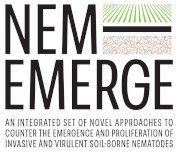Host plant resistance is an effective and sustainable way to control pests and diseases, and this especially holds true for plant-parasitic nematodes which have limited mobility and a relatively low number of generations per year. A specific resistance gene from tomatoes is especially valuable because of its unusually broad scope; it confers plant resistance to ‘tropical’ RKNs as well as to some invasive RKN species.
However, strong genetic selection has been done in tomato and potato crops due to the use of a small pool of plants containing inherent resistance over several decades. This has facilitated the proliferation of virulent populations of nematodes, reported over the last five years from all major tomato-growing regions in southern Europe. They are tropical RKN producing multiple generations per year, resulting in the rapid spread of any virulent population. In parallel, the emergence of a highly virulent PCN population was reported in Germany that can no longer be controlled by the widely used potato resistance.
